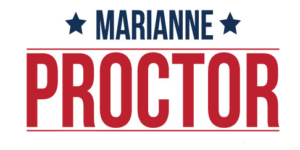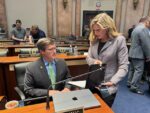Meet Rep. Marianne Proctor
By Rebecca Hanchett for LINKnky
Rep. Marianne Proctor has followed politics for quite a while. But it was government response to COVID-19 that she says showed her just how much politics can impact individual lives.
Concern with state mask mandates and closures specifically drove the speech language pathologist to step up her involvement in Northern Kentucky (“there’s a loss of learning and social skills lost” with those mandates, Proctor told LINK nky). Already active in the Boone County Republican Party, the Texan-turned-Kentuckian ran in 2022 against incumbent Sal Santoro for the Kentucky House District 60 (running through central Boone County) won.
Proctor took office in January of this year after running unopposed last fall.
The freshman lawmaker told LINK it’s her job to put her constituents first. She said none of her bills is driven by a personal agenda. That includes House Bill 312, one of Proctor’s bills filed in her first legislative session that would have exempted Boone, Kenton, and Campbell counties from the state’s certificate of need law. The bill never came to a vote, but the issue is still alive for now.
A state legislative Certificate of Need Task Force in December recommended further study in 2024 ahead of any potential reforms to the law. Proctor is a member of the group.
Kentucky’s certificate of need law is one of 35 such laws nationally, according to a Jan. 2023 brief from the National Conference of State Legislatures. Proponents say the laws are designed to help regulate health care access and costs. Opponents say the laws are anti-competitive. Proctor said Kentucky’s law is overly broad when compared to other states.
Kentucky’s law regulates at least 18 types of health care facilities, according to NCSL. That’s compared to only one type of facility (long-term care) regulated under certificate of need laws in, for example, both Ohio and Indiana.
“When I was out knocking on doors (in 2022) this was a top concern that I heard from my constituents. And I continue to hear from the people,” Proctor told LINK. “So I think it’s time for reform, certainly I think, to be aligned with what Ohio does, what Indiana does. Why we hang on to 32 different services and technologies that are regulated by certificate of need is a little bit puzzling when neighbors all around us have very limited if any (of those restrictions).”
School choice is another issue that Proctor said her constituents care about. But it looks like any new proposals to allow public funds for private education or non-common schools could potentially be left to a vote at the polls instead of a final vote in the Senate and House. That’s because of a 2022 Kentucky Supreme Court ruling that found a 2021 private school voucher law unconstitutional. A 2023 lower court ruling that found a public charter school funding statute unconstitutional adds another layer of intrigue.
Proctor said she is in full support of a referendum on the issue.
“I think that’s where it belongs,” she said. “It belongs with the people, letting them make that decision. I would rather they make the decision rather than a bunch of politicians.” What the people she represents want for their government is what, she said, should happen.
“That’s what really got me to run is the frustration of people not being responded to,” she said. According to Proctor, “I’m not coming in with an agenda. My constituents come to me and bring a concern.”
Those concerns often make it into bill form. But not every bill is assigned to a committee for review and possible approval. That legislation instead never leaves the House (or Senate) floor. Proctor would like to see that changed.
“I would like to see that every bill gets an opportunity to go to a committee and let the committees decide that. That may be an unrealistic expectation given that there are so many of us, and many of us feel the need to bring lots of bills,” she said. “But I would like to see that because I believe, at least for myself, my legislation is constituent-driven.”
Rep. Marianne Proctor (R-Union) represents District 60 which covers mid portions of Boone County. She is a member of the House Veterans, Military Affairs and Public Protection Committee, House Local Government Committee, House Families and Children Committee, and the Certificate of Need Task Force. Additionally, she is a member of the Interim Joint Committees on Families and Children, Local Government, and Veterans, Military Affairs, and Public Protection. She is also a member of several legislative caucuses.
Sign up to receive email updates on bills of interest, announcements, events, and more.

